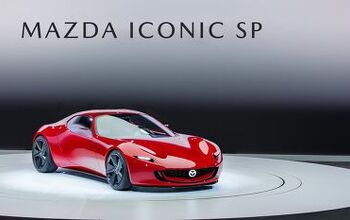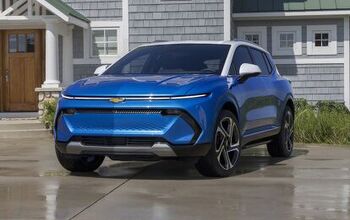QOTD: Is VW Actually Harming EV Adoption With Its Renaming?

It’s no secret that we here at TTAC don’t agree on everything when it comes to cars, culture, or politics (Or sports. Using memes to troll staffers who cheer for rival teams is a favorite pastime in our Slack channel).
We don’t speak as one editorial voice, nor do we practice neutral news reporting — we allow for editorializing, analysis, and commentary/opinion, as long as we’re fair, factually accurate, honest, and upfront about any potential biases. It’s one thing I love about working here — I can, if appropriate, put a little commentary into a news post. Overall, I try to allow everyone to be free to express themselves.
Yet, for all our various viewpoints, sometimes we agree on something. And I was right there with Matt yesterday when he fumed about Volkswagen becoming Voltswagen. The change is official, by the way — VW confirmed it.
I agree with Matt that the move is cringe-worthy marketing. I agree that it’s dumb. And I really, really, agree with this passage: “We’re now reaching the point where the segment is becoming a parody of itself. And it’s gradually turning mainstream buyers away while only serving to create more obstacles for an industry that claims to want to normalize EVs. Automakers need to stop worrying about how they’ll be branding their push into electrification and profiting off customer data and start worrying about whether or not consumers are going to be interested.”
In other words, instead of focusing on terrible marketing efforts, focus on coming out with a strong EV product, especially if you’re interested in becoming an OEM that’s considered a leader in the EV space.
Like Matt, I think these awful marketing efforts are actually counterproductive. If EVs are to grab the lion’s share of the marketplace, consumers need to see them as normal, and not exotic.
Obviously, some of that will be addressed by technology. Once ranges increase and charging times drop, and chargers become more accessible, the biggest technological hurdles to EV adoption will be cleared, and slowly, consumer adoption will increase.
But for now, with EV market share under 5 percent and many consumers still hesitant to go electric, some attempts to make EVs (and other electrified vehicles) seem special seem to be backfiring.
It’s not just VW. Remember the Volt dance? How about Ford being so afraid the Mach-E won’t sell that it borrows the Mustang name for cred, despite the fact the two cars don’t even share a platform? Or all the EV marketing that only seems to focus on green cred, while ignoring that EVs can be fun to drive and/or attractive and/or still offer utility?
I get why OEMs want to position themselves as leaders when it comes to EVs. The shift towards electrification is slowly picking up, the political winds have shifted, and there are very real concerns about climate change. OEMs want to be seen as being ahead of the curve.
But there’s a fine line between showing the masses that you’re all in on a massive technology change, one that is perceived as good for, and may actually be good for, the planet, and showing your asses when it comes to tooting your own EV bonafides.
So I ask of you, not one, but two Questions of the Day. Question one — are these marketing blunders counterproductive when it comes to getting the masses to adopt EVs? Question two — how can a manufacturer show that’s a leader when it comes to EV adoption without stepping in this sort of quicksand?
Have at it, folks.
[Image: Volkswagen Voltswagen]

Tim Healey grew up around the auto-parts business and has always had a love for cars — his parents joke his first word was “‘Vette”. Despite this, he wanted to pursue a career in sports writing but he ended up falling semi-accidentally into the automotive-journalism industry, first at Consumer Guide Automotive and later at Web2Carz.com. He also worked as an industry analyst at Mintel Group and freelanced for About.com, CarFax, Vehix.com, High Gear Media, Torque News, FutureCar.com, Cars.com, among others, and of course Vertical Scope sites such as AutoGuide.com, Off-Road.com, and HybridCars.com. He’s an urbanite and as such, doesn’t need a daily driver, but if he had one, it would be compact, sporty, and have a manual transmission.
More by Tim Healey
Latest Car Reviews
Read moreLatest Product Reviews
Read moreRecent Comments
- SCE to AUX All that lift makes for an easy rollover of your $70k truck.
- SCE to AUX My son cross-shopped the RAV4 and Model Y, then bought the Y. To their surprise, they hated the RAV4.
- SCE to AUX I'm already driving the cheap EV (19 Ioniq EV).$30k MSRP in late 2018, $23k after subsidy at lease (no tax hassle)$549/year insurance$40 in electricity to drive 1000 miles/month66k miles, no range lossAffordable 16" tiresVirtually no maintenance expensesHyundai (for example) has dramatically cut prices on their EVs, so you can get a 361-mile Ioniq 6 in the high 30s right now.But ask me if I'd go to the Subaru brand if one was affordable, and the answer is no.
- David Murilee Martin, These Toyota Vans were absolute garbage. As the labor even basic service cost 400% as much as servicing a VW Vanagon or American minivan. A skilled Toyota tech would take about 2.5 hours just to change the air cleaner. Also they also broke often, as they overheated and warped the engine and boiled the automatic transmission...
- Marcr My wife and I mostly work from home (or use public transit), the kid is grown, and we no longer do road trips of more than 150 miles or so. Our one car mostly gets used for local errands and the occasional airport pickup. The first non-Tesla, non-Mini, non-Fiat, non-Kia/Hyundai, non-GM (I do have my biases) small fun-to-drive hatchback EV with 200+ mile range, instrument display behind the wheel where it belongs and actual knobs for oft-used functions for under $35K will get our money. What we really want is a proper 21st century equivalent of the original Honda Civic. The Volvo EX30 is close and may end up being the compromise choice.


































Comments
Join the conversation
This is a well constructed April Fool's joke IMO.... Quite surprised that TTAC thinks otherwise.
VW should change their name to Voltswatten it might electrify their sales.